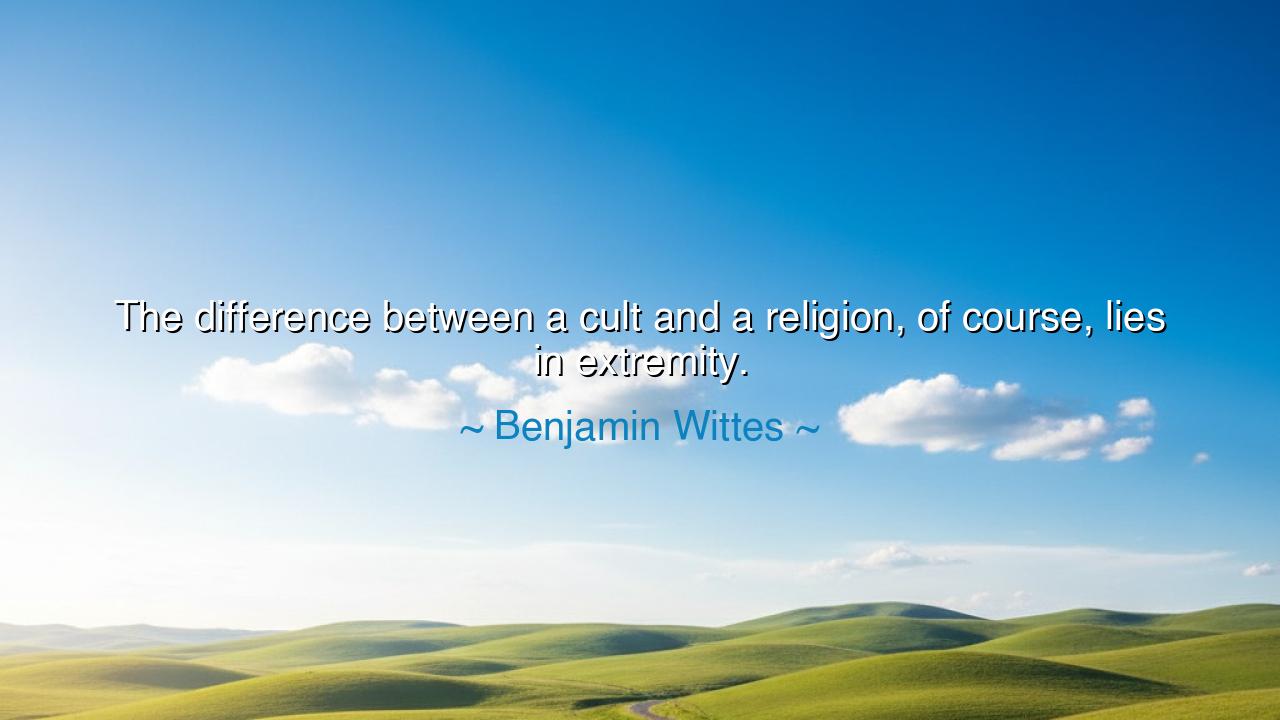
The difference between a cult and a religion, of course, lies in






“The difference between a cult and a religion, of course, lies in extremity.” – Benjamin Wittes
In this sharp and unsettling reflection, Benjamin Wittes exposes a truth that humanity has long struggled to name—that the line between faith and fanaticism is not one of kind, but of degree. His words remind us that both the cult and the religion spring from the same soil: the longing of the human spirit to find meaning, belonging, and purpose in a vast and uncertain world. Yet where religion seeks to elevate the soul toward understanding and compassion, the cult turns that yearning inward and downward, into a prison of control and fear. The difference, as Wittes tells us, lies not in the seed, but in its growth—whether it flowers toward light or chokes itself in the darkness of extremity.
The origin of this insight rests deep in the history of belief. From the dawn of civilization, men have gathered around mysteries—sacred fires, holy words, visions of the unseen. But always there have been two paths: one leading toward enlightenment, humility, and peace, and another descending into obsession and tyranny. When the love of truth becomes the worship of certainty, when devotion turns to blind obedience, and when the voice of conscience is replaced by the voice of a single man, the path of religion becomes the path of cult. Thus, Wittes’s warning is not a condemnation of faith itself, but a plea for balance, for vigilance against the slow creep of excess that corrupts even the purest beliefs.
The ancients knew this well. The Greeks spoke of hubris, the pride that made mortals believe themselves divine—and it was always hubris that summoned ruin. The prophets of old also warned against false idols: not only those of gold and stone, but those made of ideas and fear. For when belief demands that one’s heart close against mercy, or that one’s reason fall silent, it ceases to be sacred. True religion humbles; false religion exalts itself. The wise have always understood that it is extremity, not faith, that leads men astray.
Consider the story of Jonestown, that tragic community led by Jim Jones. It began, like so many noble ventures, with ideals of equality, brotherhood, and love. Yet through the poison of fanaticism, it ended in silence and death. What began as a church became a cult; what began as hope became horror. The same passion that could have uplifted souls instead consumed them. In this we see Wittes’s truth laid bare: the gulf between salvation and destruction is often measured only by the depth of a leader’s delusion, and the willingness of followers to surrender their own light.
Yet we need not look only to tragedy to understand this. The great faiths of the world—Judaism, Christianity, Islam, Buddhism, Hinduism—all began as small movements of revelation and renewal. Each carried the spark of transcendence, and yet each, at times, has wrestled with its own extremes. For even the most radiant truth, when held too tightly, becomes a weapon. It is not belief itself that divides mankind, but the measure of passion that blinds it. Thus, the challenge is eternal: to remain devoted without becoming enslaved, to revere without losing reason, to burn with conviction without letting the fire consume all else.
The lesson, then, is clear and timeless. Beware of extremity, whether in thought, in creed, or in cause. Question always the voice that demands total loyalty or forbids inquiry. A true teacher will point you toward wisdom; a false one will point only toward himself. Religion, in its highest form, is an open sky—vast, humbling, and filled with light. A cult is a locked room with no windows, where only one voice echoes in the dark. The wise soul knows the difference, not by name or number, but by the presence of freedom and compassion.
So, my child of the spirit, remember this: belief is a fire meant to warm, not to burn. Let your faith be a lantern, not a torch. Hold it high enough to see the path of others, not so low that it blinds your own eyes. For as Wittes teaches, the difference between a cult and a religion lies not in the heavens they name, but in the heart that follows them—whether it walks in the balance of truth or falls into the pit of extremity.






AAdministratorAdministrator
Welcome, honored guests. Please leave a comment, we will respond soon